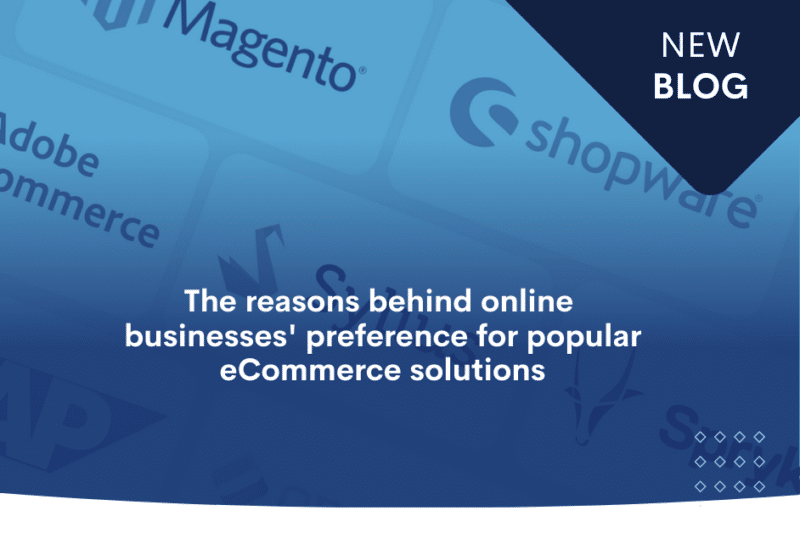Popular eCommerce solutions are often seen as the better options for businesses that want to enter the eCommerce world. This tendency stems from several reasons. First, well-known platforms usually offer a wide range of functionalities that are already well-tested and frequently updated. Second, larger platforms naturally have a bigger community of users and developers, making finding support and solving problems easier. Third, well-established solutions often integrate with more third-party services and tools, which is attractive to stores planning to expand.
Nevertheless, it is worth looking at even less known but equally good eCommerce technologies, which may be a better solution, e.g., due to the greater possibility of customization. Customization possibilities will be particularly important for businesses with specific legal regulations and products that require non-standard solutions, such as digital resources (video games), where we should care about management and access to licenses, data storage, product delivery to clients, etc.
Carrying out such a project on solutions, such as SaaS, may often be difficult due to platform policies and limitations in customizing functionality.
Which platform will be a good solution depends on the specific nature of the business. It is worth considering both those well-known platforms (Magento, Shopware, Shopify) and those less known – yet 😉 – (Sylius)
When to choose a popular eCommerce solution?
It is beneficial to be open-minded and not limit yourself to choosing one solution at the implementation analysis stage. However, some cases can favor a particular solution and make other options inefficient. To understand this more clearly, let’s look at the examples of such situations:
- My IT team consists solely of Magento developers with extensive experience, and it is easier and more time-efficient to work on and expand this solution.
- The company operates in the Asian market and wants to develop an in-house IT team. There are very few PHP developers in Asia, so all technologies based on it are not applicable.
- My team has prior experience with a particular technology, such as PHP or Java, so it is more natural for this organization to choose an eCommerce platform based on these technologies.
In other cases, when there are no very strong arguments for choosing a well-known eCommerce solution, it is worth analyzing the requirements, integrations, business goals, etc. Then, after preliminary research, select a list of technologies that would meet the criteria.
Why do companies choose well-known eCommerce platforms and not consider other solutions?
Companies often choose and stay with well-known eCommerce platforms for several key reasons involving technical and business aspects.
The table below describes these arguments for choosing a popular solution and shows how Sylius responds.
Sylius is a highly adaptable, extendable, open-source eCommerce framework with limitless scalability. Designed to be the core of your business infrastructure, it is a headless eCommerce platform that seamlessly integrates with ERP, CRM, PIM, CMS, and numerous other tools, centralizing them into one cohesive system. It also offers compatibility with various frontends, including the Vue Storefront, ensuring an optimized user experience on mobile devices.
| Argument | Sylius response |
|---|---|
| Trusted and tested solutions: Popular frameworks are already well established in the market, which builds trust among entrepreneurs. They have a history of success and well-documented use cases, which reduces the risk of project failure. Businesses have a “social proof” of the solution due to their implementation in many industries. Additionally, these solutions are further popularized by eCommerce business owners through “word of mouth.” | There are many case studies of implementing Sylius in industries like fashion, home décor, grocery or automotive, where Sylius was a base of complex projects. As seen on Github, Sylius is valued by the developers.Worth noting is that popular eCommerce solutions are often talked about when they succeed, omitting the cases where they fell short. |
| Community and support: Popular eCommerce solutions usually have a large and active community that can offer support, advice, and bug fixes. This is especially important when technical problems occur. Specialists familiar with the software on the market are also more readily available. | The Sylius Slack channel has over 7,000 active members. Additionally, there are many events, meetings, and workshops dedicated to Sylius, thanks to which the community is constantly growing. Another advantage is that Symfony developers can quickly learn Sylius and start working with it effectively. |
| Integrations with other systems: Well-known solutions often offer integrations with renowned third-party apps and services, which are crucial for efficient business operations and process automation. | Sylius also offers integration with well-known payment gateways (Adyen, Mollie, or PayPal), couriers (DHL), external systems (like Sulu CMS), and many others. |
| Stability and security: Companies invest in software that is regularly updated and maintained. Reputable eCommerce frameworks and platforms typically have the resources to maintain a high level of security and respond quickly to any vulnerabilities found. | As a niche solution, Sylius provides great security thanks to the PHP Symfony framework. In addition, the high-quality code in Sylius further minimizes the risks of security issues. |
| Implementation time and costs: Choosing niche solutions may involve higher upfront costs and longer implementation time, as they may require more time to learn and customize the platform. | The learning time is fast. Deployment time is also faster offering the ability to deploy faster compared to some popular platforms. While the initial cost of implementing Sylius may be higher compared to alternative solutions that offer more features out of the box, it proves to be much more cost-effective in the long run. Especially for industries that operate on low margins – in the case of Sylius, there is no fee for each transaction. |
| Business risks: Opting for a less-known solution involves greater business risk – there is a fear that the company behind the niche software could stop supporting the solution and leave the client with an unfinished project. | Sylius is currently blooming with a new board and team members. Over the past few months, the framework has undergone a number of improvements, and Sylius 2.0 and Sylius Cloud will be released soon. Sylius also offers project support and training for developers under the supervision of experts |
| Functionalities: Popular eCommerce platforms offer a wide range of out-of-the-box features sufficient for most online businesses. Other additional features can be easily added through existing plugins or integrations. | It is true that popular platforms often fit the needs of standard eCommerce businesses. In the case of Sylius, out-of-the-box features are not that important, as this platform is mainly used for custom eCommerce projects, where many functionalities must be done from scratch, or the existing company’s infrastructure has to be modified. |
Summary
When choosing eCommerce solutions, business owners should follow a balanced approach, valuing both the proven capabilities of popular platforms and the potential benefits of exploring niche propositions. The attractiveness of established platforms, with their extensive functionalities, communities, and available integrations, is undeniable. However, it is also important for companies to remain flexible and open to the concept of adapting their eCommerce strategies to changing customer needs. This means not only taking into account the team’s technical expertise or market-specific challenges but also considering the potential for customization and innovation that niche platforms can offer.
By conducting thorough research and considering a wide range of solutions, companies can be more confident that they will choose an eCommerce platform that will not only allow them to build an online store but also precisely respond to their current and future needs and support their development and evolution in the changing and developing world. eCommerce market.
Want to know more about Sylius?



